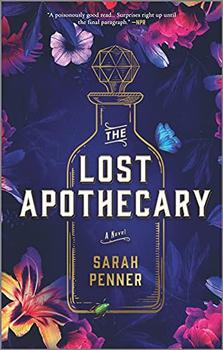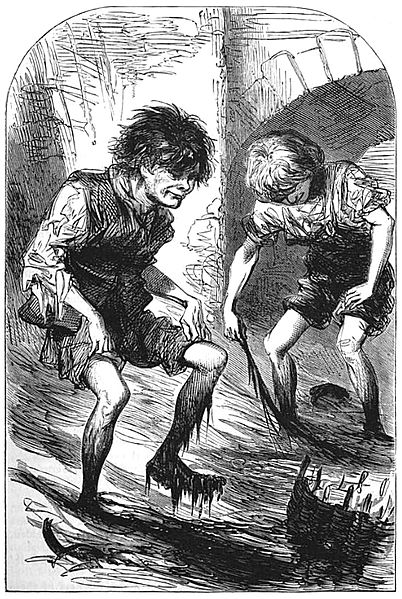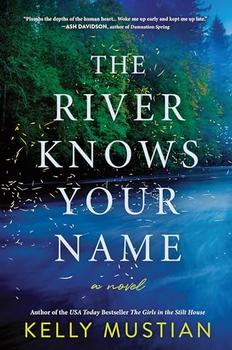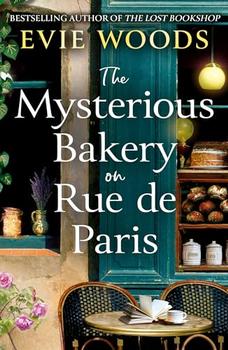Summary | Excerpt | Reading Guide | Discuss | Reviews | Beyond the book | Read-Alikes | Genres & Themes | Author Bio

A Novel
by Sarah PennerA forgotten history. A secret network of women. A legacy of poison and revenge. Welcome to The Lost Apothecary.
Hidden in the depths of eighteenth-century London, a secret apothecary shop caters to an unusual kind of clientele. Women across the city whisper of a mysterious figure named Nella who sells well-disguised poisons to use against the oppressive men in their lives. But the apothecary's fate is jeopardized when her newest patron, a precocious twelve-year-old, makes a fatal mistake, sparking a string of consequences that echo through the centuries.
Meanwhile in present-day London, aspiring historian Caroline Parcewell spends her tenth wedding anniversary alone, running from her own demons. When she stumbles upon a clue to the unsolved apothecary murders that haunted London two hundred years ago, her life collides with the apothecary's in a stunning twist of fate—and not everyone will survive.
With crackling suspense, unforgettable characters and searing insight, The Lost Apothecary is a subversive and intoxicating debut novel of secrets, vengeance and the remarkable ways women can save each other despite the barrier of time.
I was fascinated by the idea of a woman helping other women who find themselves in extremely bad situations in an era where there are no other solutions. And to have the current character doing research on the characters in the past is wonderful (Colleen T). One of the things that I really liked about The Lost Apothecary was that it is about ordinary people. Most historical novels I have read are about the lives of royalty. Sarah Penner did a lot of research on everyday life in the 1790s (Alyce T). The chapters set in 18th-century London seem well researched with their descriptions of the people, houses and social gatherings of the times. I found the information on poisons fascinating (Catherine S)...continued
Full Review
(673 words)
This review is available to non-members for a limited time. For full access,
become a member today.
(Reviewed by First Impressions Reviewers).
 In Sarah Penner's The Lost Apothecary, a historical mystery is set in motion when a character discovers a small blue vial while mudlarking. "Mudlarking" refers to the practice of scavenging for objects — generally manufactured or otherwise manmade ones that have been lost or thrown away — usually on the shore of a body of water such as a river. While one can mudlark anywhere in the world given the right conditions, the term originally described picking up items of value along the muddy banks of the River Thames in London, where Penner's novel takes place, and still has strong ties to the area.
In Sarah Penner's The Lost Apothecary, a historical mystery is set in motion when a character discovers a small blue vial while mudlarking. "Mudlarking" refers to the practice of scavenging for objects — generally manufactured or otherwise manmade ones that have been lost or thrown away — usually on the shore of a body of water such as a river. While one can mudlark anywhere in the world given the right conditions, the term originally described picking up items of value along the muddy banks of the River Thames in London, where Penner's novel takes place, and still has strong ties to the area.
Lara Maiklem, author of Mudlarking, first began scavenging on her family's farmland and has been scouring the shore of the Thames ...
This "beyond the book" feature is available to non-members for a limited time. Join today for full access.

If you liked The Lost Apothecary, try these:

Madame Sosostris and the Festival for the Brokenhearted
by Ben Okri
Published 2025
In this modern fable with the impish magic of A Midsummer Night's Dream, a masked ball makes two upper-class British couples see each other in a new light.
A wise, enchanting novel about love, power, and our many selves—past and future, public and private—from the Booker Prize–winning author.

by Ariel Lawhon
Published 2024
From the New York Times bestselling author of I Was Anastasia and Code Name Hélène comes a gripping historical mystery inspired by the life and diary of Martha Ballard, a renowned 18th-century midwife who investigates a shocking murder that unhinges her small community.



I have always imagined that paradise will be a kind of library
Click Here to find out who said this, as well as discovering other famous literary quotes!